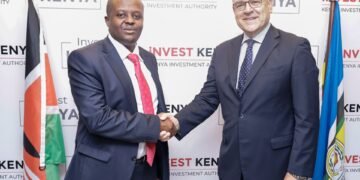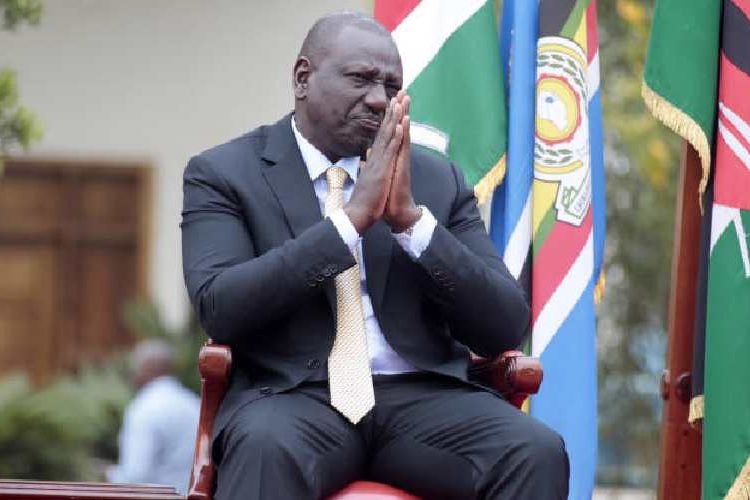The Kenya Private Sector Alliance (KEPSA) has backed President William Ruto’s move to focus on the country’s majority population, even as he pushes for economic recovery.
It has termed Ruto’s government as a ” people-driven and economy-led administration” in delivering on his election promises.
This comes even as the world continues to grapples with fears of a recession brought on by among others, Covid -19 aftershocks, supply chain disruptions and climate change.
“Kenya is likewise coping with a variety of challenges that if not tamed, could reverse progress made in our ongoing economic recovery efforts,” Kepsa said in a statement yesterday.
The economy has been vulnerable to increasing commodity prices partly because of the Ukraine-Russian conflict that has disrupted global supply chains on the importation of food, petroleum products and fertiliser, as well as affecting the export of avocados and other products.
The devastating drought, Kenya’s worst in 40 years, is another factor.
According to the Integrated Food Security Phase Classification, 3.1 million people in 23 counties in the Arid and Semi-Arid Lands (ASAL) region are food insecure.
“Given these challenges, we should be doubly motivated to act as a nation,especially following the general election and a seamless change in leadership,” Kepsa said.
The private sector lobby group affirmed its support for the government on creating a supportive business environment for job creation, economic stability and commerce.
Ruto has formed a ministry of Cooperatives and SME Development which is expected to drive growth os small and medium entreprises in the country.
Supported by the “made in Kenya” procurement policy for both local and foreign firms as well as supply chain links based on the3 0–40 per cent local content policy in government projects, this has the added potential to consolidate many of the benefits from the ‘Buy Kenya, Build Kenya’ effort.
Ruto has also made a move on Credit Referencing Bureau (CRB) framework which Kepsa now says businesses should have more access to credit as a result of the proposed transformation.
“We also applaud the creation of the Hustlers’ Fund, which will supplement current funding models like the Biashara Fund,” Kepsa said.
Growing the savings culture, the alliance has also applauded the promise to take immediate action, such as policy changes, to remedy Kenya’s subpar saving culture.
At 12 per cent, it is significantly lower than Africa’s average of 17 per cent.
“Saving is a crucial element in eradicating poverty and can also support growth opportunities in access to finance, investments and financial inclusion of marginalised populations,” Kepsa management notes.
To improve effective dispute resolution and access to justice, the government has also pledged to increase the judicial budget allocation to the worldwide standard by an additional Sh15 billion over the next five years.
The government has also taken action in relieving farmers by making affordable fertilizer available at Sh3,500 for a 50kg bag, down from Sh 6,500.
“We feel that there is more that can be done to reducing agricultural production costs and look forward to furthering engagements with sector stakeholders in outlining these areas for improvement,” it said.
As part of the ongoing effort to mitigate the effects of the drought, KEPSA is also coordinating private sector capabilities and discussions to develop proposals for actionable long-term solutions.
These includes necessary policy reviews around reducing post-harvest losses, cold-chain infrastructure, value addition,and blending, as well as ring-fencing drought mitigation contingency planning and action.
The private sector is also cognisant of the government’s commitment to maintaining the tax code’s consistency and predictability ,to support long-term investment strategies.
This, it says, will help make the policy and regulatory framework around tax collection and administration more transparent.
It also goes hand in hand with the proposal to reconstitute the Kenya Revenue Authority into the Kenya Revenue Service.
The government can use a “demand-driven consumption” paradigm to use its big budget for purchases to organically generate wealth and jobs, Kepsa said.
This would significantly contribute to Kenya’s efforts to achieve middle-income status by2030 by eliminating socioeconomic inequities and fostering resilience and social stability.
The alliance has committed to collaborating with the national and county governments, among other stakeholders, through the various Kepsa roundtables and public-private dialogue forums, in the pursuit of yearly improvements in the overall business environment.






























































